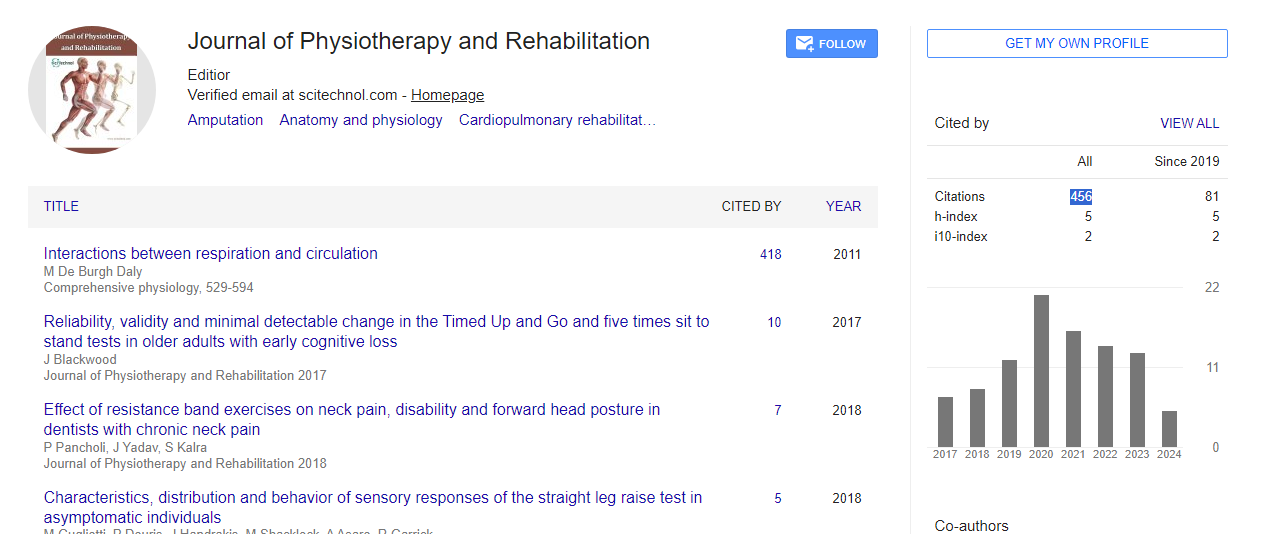Opinion Article, J Physiother Rehabi Vol: 7 Issue: 4
Strengthening Cognitive Adaptability in Impaired Individuals
Bren Patrizio*
1Department of Physical Medicine and Rehabilitation, Rutgers University, Newark, New Jersey, United States of America
*Corresponding Author: Bren Patrizio,
Department of Physical Medicine and Rehabilitation, Rutgers University, Newark,
New Jersey, United States of America
E-mail: brenpatri@rutu.edu
Received date: 24 July, 2023, Manuscript No. JPTR-23-114326;
Editor assigned date: 27 July, 2023, Pre QC. JPTR-23-114326 (PQ);
Reviewed date: 10 August, 2023, QC No. JPTR-23-114326;
Revised date: 17 August, 2023, Manuscript No. JPTR-23-114326 (R);
Published date: 24 August, 2023, DOI: 10.4172/JPTR.1000151
Citation: Patrizio B (2023) Strengthening Cognitive Adaptability in Impaired Individuals. J Physiother Rehab 7:4.
Description
Cognitive impairment can significantly impact an individual's quality of life, making even the simplest daily tasks challenging. However, there is opportunity for those affected by cognitive deficits. Cognitive rehabilitation provides a potential path towards improving cognitive functioning and enhancing overall well-being.
Cognitive impairment encompasses a wide range of conditions, including but not limited to dementia, Traumatic Brain Injuries (TBI), stroke and neurodevelopmental disorders. These conditions can result in deficits in memory, attention, problem-solving and decisionmaking, among other cognitive functions. Such impairments often lead to difficulties in performing everyday tasks, maintaining relationships and achieving independence.
Cognitive rehabilitation is a systematic, evidence-based approach aimed at restoring or improving cognitive functioning in individuals with cognitive impairment. Its primary goal is to enhance an individual's ability to perform daily activities and regain a sense of control over their life. Cognitive rehabilitation programs are customized for each person's unique needs, considering the specific cognitive deficits they face.
Cognitive exercises and tasks designed to target specific cognitive domains, such as memory or problem-solving, are a fundamental part of cognitive rehabilitation. These exercises challenge and stimulate the brain, promoting cognitive growth and adaptation.
For certain cognitive impairments, individuals may be taught compensatory strategies. These strategies help them work around their deficits, such as using memory aids or organizational tools.
Cognitive rehabilitation often integrates real-life activities into therapy sessions. This approach allows individuals to apply their cognitive skills in practical situations, fostering independence.
Providing individuals and their families with information about the nature of cognitive impairment, adaptation techniques and available resources is an essential component of cognitive rehabilitation.
Cognitive rehabilitation is most effective when it involves a team of healthcare professionals, including neuropsychologists, speech therapists, occupational therapists and social workers. This collaborative approach ensures a comprehensive and holistic treatment plan.
Cognitive rehabilitation offers a multitude of benefits, ultimately leading to an improved quality of life. It fosters enhanced cognitive function, including memory, attention and problem-solving skills, which are often compromised in cognitive impairment. The regaining of independence in daily tasks is a particularly rewarding outcome, alleviating caregiver burden and promoting self-reliance. Moreover, cognitive rehabilitation's positive effects extend to social engagement, countering feelings of isolation and bolstering emotional well-being by reducing symptoms of anxiety and depression. Although there is an initial investment, the long-term cost savings through decreased healthcare needs and reduced caregiver support are substantial.
Cognitive rehabilitation faces challenges such as varying progress rates and issues with motivation and therapy adherence, particularly in severe cognitive impairment cases. Looking ahead, emerging fields like neurofeedback, virtual reality and brain-computer interfaces demonstrate potential for improving cognitive rehabilitation. Ongoing analysis further refines effective interventions for specific cognitive deficits.
Conclusion
Cognitive impairment is a challenging and often life-altering condition, but cognitive rehabilitation offers a path to recovery and improved quality of life. Adapting interventions to individual needs and utilizing the incredible potential of the brain for adaptation, cognitive rehabilitation gives comfort and assistance to those living with cognitive deficits.
 Spanish
Spanish  Chinese
Chinese  Russian
Russian  German
German  French
French  Japanese
Japanese  Portuguese
Portuguese  Hindi
Hindi 